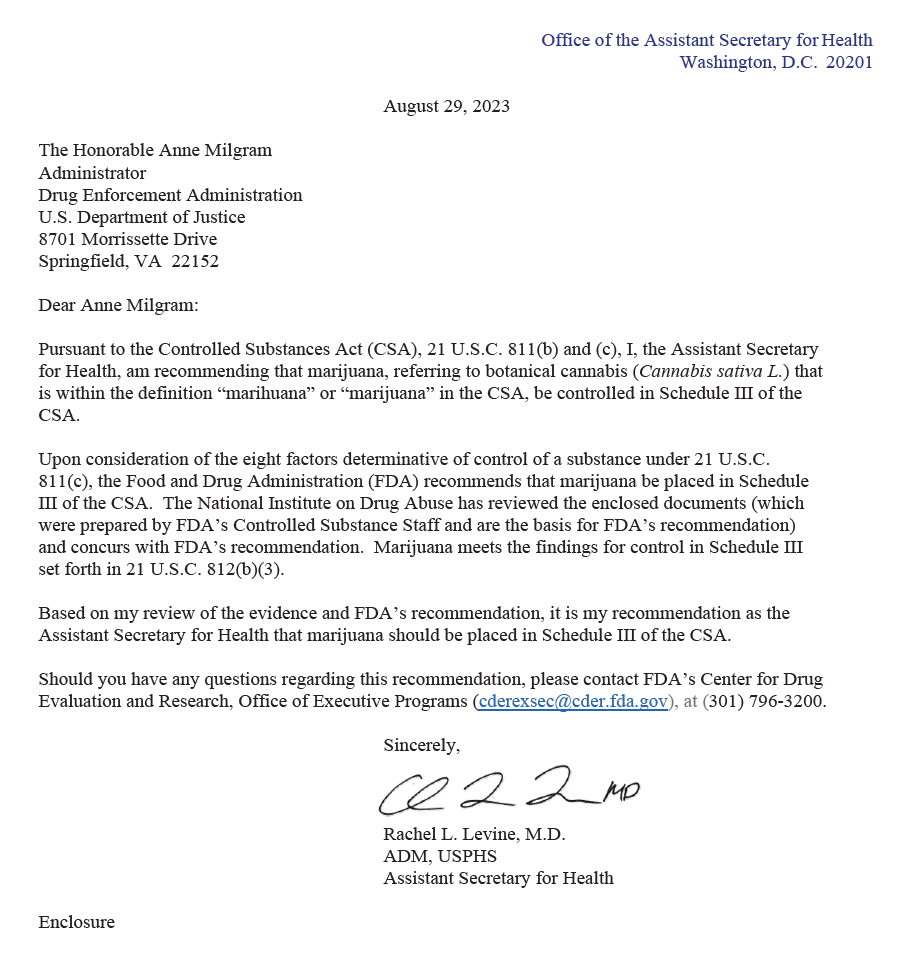Official Release: Government Confirms Schedule III Recommendation for Marijuana Based on Recognized Medical Utility
In a groundbreaking move, the U.S. government has unveiled a trove of documents shedding light on the ongoing evaluation of marijuana’s federal classification. For the first time, it officially confirms that health officials are urging the Drug Enforcement Administration (DEA) to designate cannabis as a Schedule III substance under the Controlled Substances Act (CSA).
The released 252 pages from the Department of Health and Human Services (HHS) assert that cannabis possesses a “currently accepted medical use in treatment in the United States” and exhibits a “potential for abuse less than the drugs or other substances in Schedules I and II.”
The documentation highlights that over 30,000 healthcare professionals in 43 U.S. jurisdictions are authorized to recommend medical marijuana to more than six million registered patients for at least 15 medical conditions.
Attorney Matt Zorn, who obtained the documents through a Freedom of Information Act (FOIA) request, published the confirmation of the Schedule III recommendation on his On Drugs blog. The materials include a letter to DEA Administrator Anne Milgram stating that “marijuana meets the findings for control in Schedule III.”

via Matt Zorn, On Drugs blog
The documents delve into the government’s eight-factor analysis for drug scheduling, emphasizing marijuana’s abuse potential, its accepted medical use, and its safety and risk of physical dependence compared to other substances.
On the subject of medical use, the review acknowledges the widespread legalization of medical marijuana across U.S. states, with some programs having been in place for several years. The memo discusses mixed findings on the effectiveness of marijuana for various medical
indications, highlighting a substantial evidence base for its use in treating pain conditions, particularly neuropathic pain.
The Food and Drug Administration’s (FDA) review, however, did not find support for marijuana in treating epilepsy or anxiety. The agency also expressed reservations about the potential risks associated with using marijuana to treat PTSD, stating that adverse events might outweigh limited benefits.
While some evidence supports marijuana’s benefits for Crohn’s disease, the overall assessment suggests a credible scientific foundation for its therapeutic use in pain management, anorexia related to certain medical conditions, and nausea and vomiting (e.g., chemotherapy-induced).
“Taken together, the data support that a substantial number of [health care practitioners] have gained clinical experience with at least one specific medical use of marijuana under state-authorized programs.”
Despite not being an unequivocal endorsement of marijuana’s medical benefits, federal health officials asserted that none of the evidence identified safety concerns precluding its therapeutic use. The evaluation also concluded that the public health risks of marijuana are low compared to other drugs of abuse, including heroin, cocaine, and benzodiazepines.
The National Institute on Drug Abuse (NIDA) aligns with this analysis, as stated in the documents.
In response to the release, Rep. Earl Blumenauer (D-OR), founder of the Congressional Cannabis Caucus, sees this development as progress toward ending prohibition. The information disclosed provides a level of public transparency not seen before in the government’s rescheduling review.
In August, initial reports surfaced regarding the health agency’s recommendations for rescheduling marijuana. The prevailing belief centered on the likelihood of the HHS proposing a Schedule III classification, aligning it with substances such as ketamine and Tylenol with codeine. The recently released documents to Matt Zorn confirm this detail officially.
Should the DEA choose to adopt the HHS recommendation and move marijuana to Schedule III, it wouldn’t equate to broad legalization under federal law. However, it could wield significant influence by dismantling research barriers that have faced widespread criticism. Moreover, it might permit state-licensed cannabis businesses to access federal tax deductions currently restricted by IRS Code 280E.
It’s crucial to note that the ultimate decision on rescheduling lies with the DEA, a point reiterated in a recent letter to Congress. The DEA holds the authority to schedule, reschedule, or deschedule a drug under the Controlled Substances Act, considering statutory, regulatory, and HHS’s scientific evaluations. The agency is currently in the process of conducting its review.
Responding to a letter from 31 bipartisan lawmakers led by Rep. Earl Blumenauer, the DEA emphasized its commitment to evaluating the “merits” of legalization during the review. The lawmakers had raised concerns about the limitations of merely placing cannabis in Schedule III, rather than completely removing it from CSA control.
The timing of any rescheduling announcement remains uncertain, sparking speculation within the cannabis community. The Congressional Research Service (CRS) suggested in September that the DEA is likely to follow the HHS recommendation based on historical patterns.
Last year, the governors of six U.S. states—Colorado, Illinois, New York, New Jersey, Maryland, and Louisiana—urged President Joe Biden to reschedule marijuana by year-end, emphasizing its alignment with a safe, regulated product. While opinions on recreational cannabis legalization may differ among governors, the consensus is that the cannabis industry is a permanent fixture, with states implementing robust regulations.
Colorado Governor Jared Polis expressed anticipation of the DEA expeditiously completing the review and moving marijuana to Schedule III. However, he emphasized the need for additional administrative and congressional actions to promote health, safety, and economic growth.
In contrast, six former DEA heads and five former White House drug czars voiced opposition to the HHS’s recommendation, presenting concerns about the potential impact on drug schedules and criminal penalties. However, attorneys general from a dozen states took a different stance on Friday, urging the DEA to proceed with rescheduling as a “public safety imperative.”
While some anticipate that a Schedule III classification would benefit state-legal marijuana markets, cautionary voices warn of potential risks to broader state-level legalization. The ongoing developments highlight the complex interplay between federal decisions and their ramifications on cannabis regulation.

